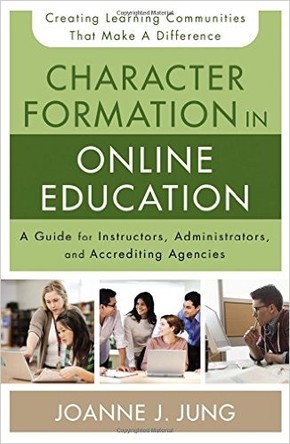 Joanne Jung (Associate Professor of Biblical and Theological Studies at Talbot School of Theology) recently finished writing Character Formation in Online Education: A Guide for Instructors, Administrators, and Accrediting Agencies and it will be released on October 13, 2015. We wanted to learn more about this book, so we had Joanne respond to some questions:
Joanne Jung (Associate Professor of Biblical and Theological Studies at Talbot School of Theology) recently finished writing Character Formation in Online Education: A Guide for Instructors, Administrators, and Accrediting Agencies and it will be released on October 13, 2015. We wanted to learn more about this book, so we had Joanne respond to some questions:
We heard that you recently released a new book. What is the book about?
Character Formation in Online Education is a highly practical resource for creating online courses that inspire students and foster their transformation. It starts with the philosophy of good online pedagogy that involves the heart and includes practical steps of working with an instructional designer. Chapters that address practical ways to maximize learning using the features of a Learning Management System make up the midsection of the work. Integration of faith and learning as well as assessment matters are also critical to good online pedagogy.
What is the general topic of this book and what made you feel like a book on this topic was needed?
The satisfaction of seeing transformation in my students taking an online course seemed so different from what I would read or stories I had heard from professors and students alike about their online course experiences. I wanted to present a perspective of online teaching that not only fosters deep learning but transformation.
What’s the most counterintuitive part of your book?
The most counterintuitive part of the book is understanding that character formation can occur, and has already been achieved, through online classes.
If you had to pick one quote (or one takeaway) from your book that everyone would take to heart, what would it be?
Great professors inspire students, and now they get to do it online.
How would you like to see this book used?
I would like to see the ideas presented in this book used by professors who have been challenged to create online courses and are a bit fearful of this endeavor or who want to improve their own experience in teaching online classes. It would be thrilling to know that these ideas inspired professors to come up with their own ways to connect with student learning through establishing and building a strong learning community.
Who is your target audience and how will they benefit from reading the book?
Though the main target audience would be those involved in teaching online courses in Christian academic institutions, there are many others who would benefit from reading this book. Christian professors in secular institutions, instructional designers, administrators and those associated with accrediting agencies, and even pastors who want to maximize their online presence with viewers or seek to present training through a hybrid model would find helpful and practical ways to sharpen their offerings.
What led you to write the book? How does this book relate to your previous scholarship? And how does it intersect with your classroom teaching at Talbot?
Only God could weave three seemingly unrelated threads of my life together—spiritual formation, online education, and the English Puritan practice of conference—to produce this book. Professors desire to impact students toward growth and maturity, to be spiritually transformed, and this desire can be effectively achieved when offering a course in an online format. Online education is an integral part of the future of education. My experience has proven to me that when the bar is raised in not just information transfer, but in learning that engages and inspires, our students benefit. And “conference”? That’s what the English Puritans called meeting together in groups where their Bible knowledge—wherever that was on a spectrum—was met with genuine care for one another’s souls. That’s where my interest in transferring the sense of learning through communities came into play.
The ideas in this book come from experience translating course lectures, materials, learning activities, and student engagement from a residential format to an online format. In turn, online activities have influenced my use of various features of a Learning Management System in courses offered in a residential format.
Can you share with our readers a small excerpt (a paragraph or so) from the book?
“Great teachers are familiar with challenges. Such challenges, though, prompt them to achieve the kind of learning environments where they and their students thrive. These professors understand that an online course is far more than putting teaching videos online, having little or no communication with students, and then giving a final exam or receiving a final paper as the sum total of their classes. Refusing to settle for suboptimal courses, great teachers believe the most effective type of teaching—whether a statistics, language, biology, or theology course—affects the whole person.
“The growing numbers of online courses provide strategic intersections between learning and character formation. This book has not offered lofty ideas, imagined for the ideal online class, but rather practical guidance borne out of real-life online teaching experiences. Seeking to bring about character formation in students can be a challenge but is well worth the investment. There is nothing quite like witnessing lives being transformed before your very eyes (even if it is on a computer screen).”
In a sentence or two, what is the main “TAKE AWAY” you want your readers to get from your new book?
Here’s a book that will calm your fears in creating online courses, dispel the myth that online courses cannot foster character formation, and inspire you to provide what is needed to impact character formation in your students.
 Biola University
Biola University
.jpg)


.jpg)